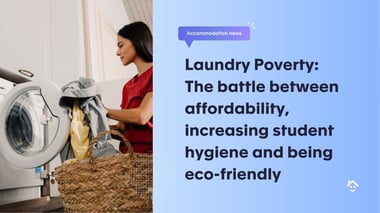Student landlords are facing several challenges in 2022, from reforms to the deposit and eviction rules, as well as proposed energy efficiency changes.
This is a complex time for buy to let investors and here, the Accommodation for Students team look at some of the issues facing the student accommodation sector.
Reforms for lifetime deposits and evictions
The delayed Renters Reform Bill will make a reappearance in the New Year when a White Paper is published.
The highlight is a proposal to abolish Section 21 which enables a landlord to end a rolling tenancy with two months’ notice without giving their tenant a reason.
The new law will also introduce plans for the replacement of rental security deposits and replace them with a lifetime deposit instead.
Essentially, the deposit will move with the tenant so they don't have to raise a deposit every time and can simply move their deposit to a new home.
The Renters Reform Bill also looks set to give the public access to the rogue landlords’ database.
Landlord tax relief changes
The deadline for a landlord’s online self-assessment tax return is Monday 31 January for the 2020-2021 tax year.
If you miss the deadline, then there might be a financial penalty to pay.
Also, your 2020-21 tax return is the first that will see the new mortgage interest tax relief credit apply.
This is a controversial credit that has been phased in since 2017 by the government.
This means that landlords can now offset only 20% of their mortgage interest payments when a tax return is filed.
It's also worth noting that the Chancellor in his Autumn Budget unveiled changes to the deadlines for reporting and paying capital gains tax (CGT) when a landlord disposes of properties.
This change has now come into force and landlords will have 60 days to report and then pay their CGT bill when they sell a buy to let property - previously there was a 30-day limit.
PRS energy efficiency rules
It looks likely that in 2022, the government will strengthen the energy efficiency rules for the PRS.
The deadline for ensuring all newly let homes have a minimum Energy Performance Certificate (EPC) rating of C has been extended from 2025 to 2026.
For existing lets, the deadline is 2028.
There's still no indication on the financial cap that a landlord must pay for improving their properties to meet the rating, so it's a case of wait-and-see for landlords as to what specific work will be necessary – and whether any government cash will be made available for the work.
Local landlord licensing schemes could increase
While landlord licensing schemes run by councils have caused confusion and complaints that the schemes are inconsistent and over how much they cost landlords to register, it looks like they are here to stay.
There are a number of councils that demand that all, or some, of the landlords in their area must first get a licence before they let property.
It looks likely that licensing schemes will expand despite a government review finding issues with the licensing system in 2019.
It's always worthwhile checking with a local authority whether you need a licence for letting a property in that area - even if yours isn't a house in multiple occupation (HMO) which have a mandatory licensing scheme in place.
Pet-friendly tenancies
A new model tenancy agreement unveiled in January by the government saw landlords no longer having the right to ban their tenants from having pets in a rental property in England.
Now, landlords need to object in writing should a tenant submit a pet request - and they can only reject this for ‘good reason’ such as the property being too small so that pet ownership is impractical.
Carbon monoxide requirement changes
New rules were unveiled in November that require carbon monoxide alarms to be fitted in private and social rented properties that have appliances such as gas fires and boilers.
The new rules mean that an alarm must be fitted when a new appliance is installed - and a landlord must replace or repair a carbon monoxide or smoke alarm when told they are faulty.
Other issues for student landlords to consider in 2022
There is some good news for student landlords in 2022, and that is a prediction from property portal Zoopla that rent prices will grow by 4.5% over the year.
They say that the growth in rents will be fuelled by tenants returning to London after the pandemic and in the capital, these rises will exceed the rent levels recorded before Covid-19.
There will also be a growing number of ‘green’ mortgages available for those landlords who invest in energy-efficient properties.
While this remains a buy to let mortgage niche, this could change with a growing number of lenders moving into the market.
Along with cheaper rates for landlords to buy green properties, more banks are offering funds at reduced rates to landlords if they want to pay for sustainable property improvements.
Along with green mortgages, a recent rise in the Bank of England base rate could affect buy to let mortgage rates in 2022.
Finance experts say that while the base rate will affect the costs for lenders when they borrow money, a rise will also lead to higher mortgage rates.
However, experts also say that buy to let mortgage lenders will attract landlords by offering cashback incentives and fee-free deals.




